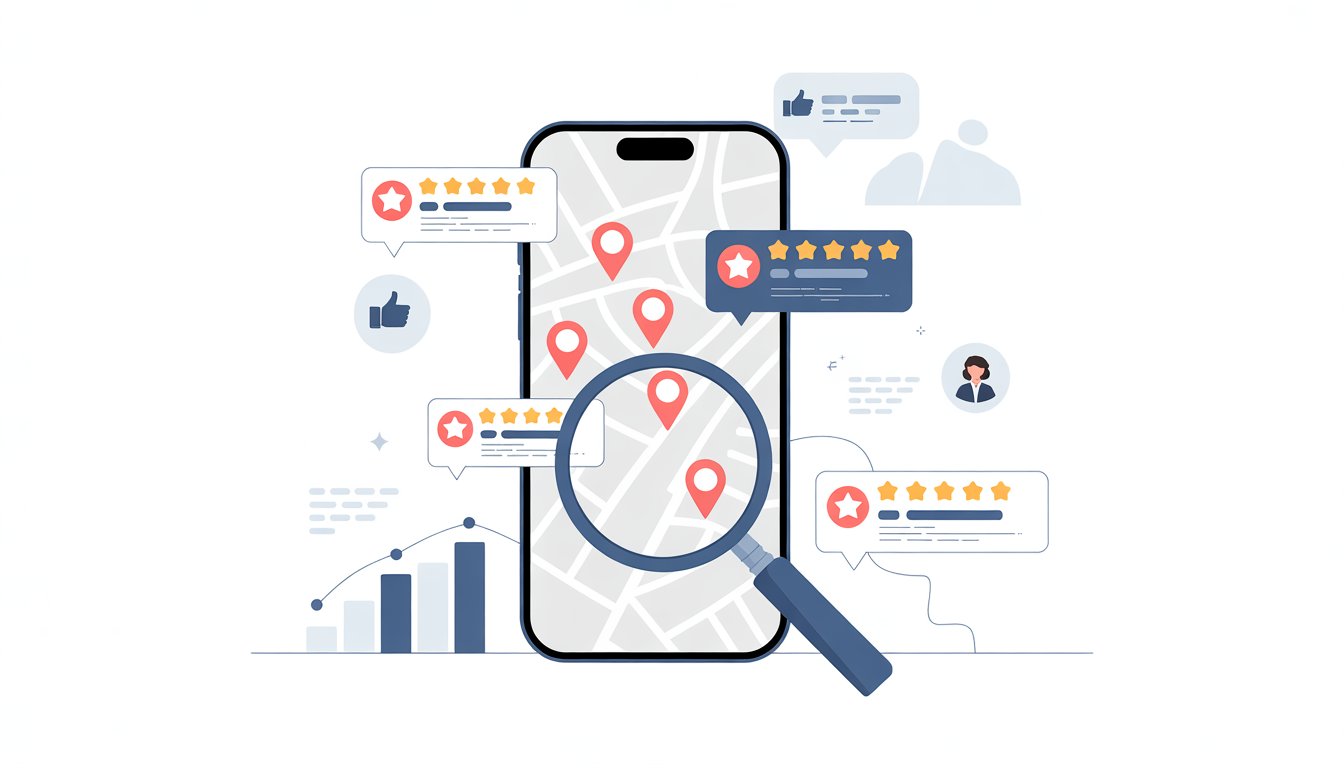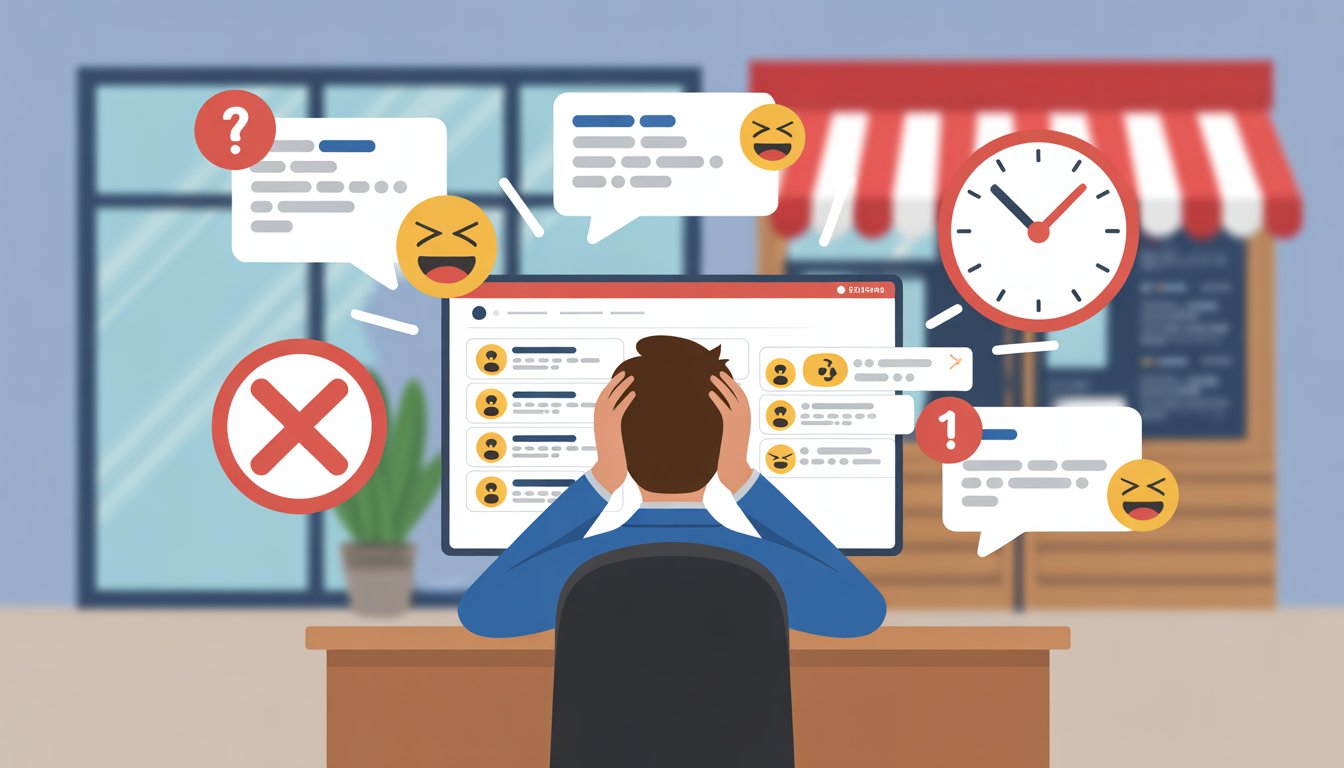Online reviews have a significant impact on your local search rankings. Reviews account for approximately 16% of Google's local ranking factors, making them one of the most important elements for local SEO success.
Businesses with higher ratings and more positive reviews consistently appear at the top of local search results. Those with few or poor reviews struggle to gain visibility.

When potential customers search for local businesses, Google uses review signals to determine which companies deserve the top spots. Your star rating, review quantity, and recent feedback all send strong signals about your business quality and customer satisfaction.
Studies show that businesses with 4.0+ star ratings rank significantly higher than those with lower ratings. Companies with no reviews rank about 12% lower in search results.
The relationship between reviews and rankings goes beyond simple star counts. Google analyzes review content for relevant keywords, considers how recently reviews were posted, and evaluates your responses to customer feedback.
This means your review strategy directly affects how many local customers will find your business when they search online.
Key Takeaways
- Reviews make up about 16% of Google's local ranking factors and directly influence where your business appears in search results.
- Businesses with 4.0+ star ratings and regular fresh reviews consistently outrank competitors with fewer or older reviews.
- Managing and responding to reviews professionally helps improve both your search visibility and customer conversion rates.
How Reviews Influence Local Search Rankings

Reviews act as trust signals that search engines use to determine which businesses deserve top positions in local search results. Google's algorithm evaluates multiple review-related factors to decide your ranking in the local 3-pack and organic search results.
Factors that Affect Local Search Visibility
Your total review count serves as a primary ranking signal in local search. Businesses with more reviews typically outrank competitors with fewer reviews, even when ratings are similar.
Star ratings between 4.2 and 4.7 perform best in local search results. Perfect 5.0 ratings can actually hurt your rankings because they appear less authentic to Google's algorithm.
Review distribution across platforms matters significantly. Google Reviews carry the most weight, but reviews on other platforms like Yelp and Facebook also contribute to your local search visibility.
The keyword content within reviews helps search engines understand your business relevance. When customers naturally mention your services, location, or business name in reviews, it strengthens your local search signals.
Review response rates above 80% demonstrate business engagement. While responses don't directly boost rankings, they increase customer trust and click-through rates from SERPs.
The Role of Review Signals in Google's Algorithm
Google's local search algorithm treats reviews as credibility indicators for local businesses. The search engine analyzes review patterns to identify authentic feedback versus fake reviews.
User engagement with reviews sends strong signals to Google. When people mark reviews as helpful or interact with review content, it tells the algorithm these reviews provide value.
Review signals work alongside other local SEO factors like NAP consistency and proximity. Reviews often serve as the tiebreaker when businesses have similar optimization levels.
Google evaluates review authenticity through various signals including reviewer history, review timing patterns, and content quality. Businesses with natural review patterns rank higher than those with suspicious review activity.
Schema markup for reviews helps Google display rich snippets in search results. This technical implementation can improve your click-through rates and local search visibility.
Impact of Review Velocity and Recency
Fresh reviews carry more ranking weight than older ones in Google's local search algorithm. Recent reviews show your business actively serves customers and maintains current service quality.
Your monthly review velocity should stay consistent rather than coming in large bursts. Steady review acquisition signals natural customer flow to search engines.
Target these review acquisition rates based on your business type:
Business TypeMonthly ReviewsTotal ReviewsSmall Services3-5 reviews20-30 reviewsRestaurants15+ reviews150+ reviewsProfessional Services2-3 reviews20-30 reviews
Review timing patterns affect your local search rankings. Reviews that come immediately after business registration or in unusual patterns can trigger algorithm penalties.
Recent data from BrightLocal shows businesses receiving regular fresh reviews see ranking improvements within 30-60 days. Your review recency directly correlates with local search performance.
Types and Sources of Reviews That Matter Most

Different review platforms carry different weights when it comes to local search rankings. Google My Business dominates local search results, while third-party platforms like Yelp and Facebook provide additional trust signals that search engines value.
Google My Business and Its Local Pack Dominance
Google My Business reviews have the strongest impact on your local search rankings. These reviews directly influence your position in the local pack—the top three business results that appear below the map.
Your Google Business Profile reviews count as review signals that make up about 9% of local ranking factors. The algorithm looks at three key elements from your reviews.
Review count shows Google that customers actively engage with your business. More reviews signal higher customer volume and activity.
Review recency matters because fresh reviews indicate ongoing business operations. A steady stream of new reviews tells Google your business stays relevant.
Star ratings provide quick quality indicators. Higher average ratings help you rank above competitors with similar optimization levels.
Reviews on your Google Business Profile appear directly in search results. This gives them more visibility than reviews on other platforms.
Third-Party Review Platforms: Yelp, Facebook, and More
Third-party review sites add credibility signals that Google considers when ranking local businesses. These platforms serve as independent validation of your business quality.
Yelp reviews carry significant weight, especially in certain industries like restaurants and services. Yelp's own search results also compete with Google for local search traffic.
Facebook reviews matter because of Facebook's large user base and social signals. Many consumers check Facebook pages before visiting businesses.
Other important review platforms include:
- Industry-specific sites (TripAdvisor for travel, Healthgrades for medical)
- Better Business Bureau
- Angie's List for home services
The key is having reviews across multiple platforms. This creates a comprehensive online reputation that search engines view as more trustworthy than reviews on just one site.
Importance of Business Listings Consistency
Consistent business information across all review platforms strengthens your local search rankings. Search engines need to verify that reviews belong to the same business entity.
Your business name, address, and phone number (NAP) must match exactly across all platforms. Even small differences can confuse search algorithms and weaken the connection between your reviews and rankings.
Business categories should align across platforms. If you're listed as a restaurant on Google but a bar on Yelp, it creates confusion about your business type.
Hours of operation and other details should stay consistent. Mismatched information reduces trust signals from your reviews.
Regular audits of your business listings help maintain this consistency. Tools can help you monitor how your business appears across different review sites and directories.
Review Quality, Volume, and Authenticity
The number of reviews you have, how real they are, and their quality work together to boost your local rankings. Google looks at all three factors when deciding where your business appears in search results.
Impact of Review Volume on Rankings
More reviews generally mean better rankings. Search engines see a high volume of customer reviews as a sign that your business is active and popular.
Review volume impacts about 20% of your local visibility on Google. Businesses with more positive reviews appear higher in search results than those with fewer reviews.
You need a steady flow of new reviews to stay competitive. Review recency matters as much as total count. Google favors businesses that get fresh reviews regularly over those with many old reviews.
Getting 3-5 new reviews per month keeps your business visible. Check how many reviews your competitors get each week.
You should aim to match or beat their review volume to stay ahead. Businesses need at least a 4.0-star rating to show up in searches with "best" or "top" in them.
Google adds a filter that blocks businesses below 4.0 stars from these valuable searches.
Why Authentic Feedback Matters to Search Engines
Authentic feedback carries more weight than fake reviews. Google uses AI systems to detect and remove spam reviews, which improved fake review detection by 40% in 2024.
Real customer reviews include specific details about your service. They mention employee names, describe problems you solved, and talk about their experience with your team.
Reviews with photos tend to rank higher and stay visible longer. Visual content adds credibility and helps push negative reviews down from the top of your profile.
Google now adds warning labels to businesses caught with fake reviews. The label says "Suspected fake reviews were recently removed from this profile."
This hurts your credibility with potential customers. Detailed reviews help your SEO more than short ones.
Long reviews with keywords about your services can boost rankings for those terms.
Managing Fake and Negative Reviews
Report fake reviews through Google's review management tool. If the first report doesn't work, you can appeal the decision or contact Google support directly.
Fake positive reviews from competitors might boost their rankings short-term. But reporting them rarely gets them removed or hurts competitor rankings significantly.
Don't fear negative reviews completely. Businesses with ratings between 4.7-4.8 stars often seem more trustworthy than perfect 5-star ratings.
Respond to negative consumer reviews professionally. Show you care about customer concerns and offer solutions publicly.
You can push down negative reviews by getting more positive reviews with photos. Ask satisfied customers to add pictures of your completed work to their reviews.
Review Management Strategies for Local SEO
Building a strong review profile requires consistent effort across three key areas: getting more reviews regularly, creating better customer interactions, and using the right tools to manage everything efficiently.
Ongoing Review Acquisition Techniques
Ask customers directly for reviews when they're most satisfied. This happens right after a purchase or service completion.
Send automated email requests 24-48 hours after a transaction. Keep the message short and include direct links to your Google Business Profile.
Train your staff to request reviews during positive interactions. A simple "Would you mind leaving us a quick review?" works well.
Use text messages for immediate review requests. SMS has higher open rates than email and feels more personal.
Post signs in your business asking for reviews. Put them near checkout areas or waiting rooms where customers have time to act.
Create incentive programs that reward customers for honest reviews. Offer small discounts or loyalty points for participation.
Time your requests carefully. Don't ask during complaints or busy periods when customers feel rushed.
Optimizing for User Engagement and Customer Experience
Respond to every review within 24-48 hours. This shows you care about customer feedback and improves your local rankings.
Thank positive reviewers by name when possible. Mention specific details they shared to show you read their feedback carefully.
Address negative reviews with empathy and solutions. Apologize for problems and offer to fix issues offline.
Use keywords naturally in your responses. Include your business name, location, and services without sounding forced.
Keep responses professional but friendly. Match the customer's tone while staying business-appropriate.
Follow up offline with unhappy customers. Call or email them directly to resolve problems before they escalate.
Monitor review trends to spot recurring issues. Fix operational problems that generate multiple complaints.
Leveraging Review Management Tools
Centralized dashboards let you track reviews across Google, Yelp, and Facebook from one place. This saves time and prevents missed responses.
Automated alerts notify you immediately when new reviews appear. Quick responses show customers you're actively engaged.
Response templates help maintain consistent messaging while saving time. Customize them for different situations and review types.
Analytics features show review volume trends and rating changes over time. Use this data to measure your reputation management success.
AI-powered tools can suggest response drafts for common review types. These speed up your workflow while maintaining quality.
Team collaboration features let multiple staff members handle reviews without duplicating efforts or missing responses.
Reporting capabilities track key metrics like response rates and average ratings across all locations for multi-location businesses.
The Role of Reviews in Reputation and Conversion
Reviews shape how customers see your business. They serve as trust signals that drive purchasing decisions and provide opportunities to demonstrate customer service excellence.
Online Reputation and Trust Signals
Your online reputation depends heavily on customer reviews across platforms like Google and Yelp. Reviews act as social proof that potential customers use to judge your business before making contact.
Positive reviews build credibility in several key ways:
- They show real customer experiences
- They highlight specific services and results
They create trust with detailed testimonials.
More than half of consumers skip businesses with poor ratings. Your review profile directly impacts who considers your services.
Star ratings matter most for quick decisions. Customers often scan ratings before reading individual reviews.
Businesses need at least a 4.0-star rating to appear in searches for "best" or "top" services.
Photo-rich reviews carry extra weight. Visual content adds authenticity that text-only testimonials cannot match.
These reviews also tend to stay visible longer on your profile.
Boosting Conversion Rates with Social Proof
Reviews directly impact your bottom line through improved conversion rates. Businesses with more than 100 reviews earn 52% more revenue than those with fewer than 10 reviews.
Customer testimonials work as powerful sales tools because they:
- Address common customer concerns
- Show specific problems you solve
They demonstrate your team's expertise.
Detailed reviews that mention employee names and specific services create stronger social proof. These testimonials help potential customers picture working with your business.
A steady stream of new reviews signals an active, reliable business. Customers trust companies that consistently earn positive feedback over time.
The content within reviews matters too. When customers mention specific keywords related to your services, it helps other potential customers find relevant information about what you offer.
Responding to Reviews for Customer Satisfaction
Your response to reviews shows current and future customers how you handle feedback. This practice directly affects customer satisfaction and your business reputation.
Respond to both positive and negative reviews to maximize impact:
- Thank customers for positive feedback
- Address specific concerns in negative reviews
Offer solutions publicly when problems arise.
Negative reviews become opportunities to demonstrate excellent customer service. A thoughtful response can turn a complaint into a showcase of how you care about customers.
Response timing affects perception. Quick responses show you actively monitor feedback and care about customer experiences.
Some negative reviews actually help your reputation management efforts. Ratings between 4.0-4.8 stars appear more trustworthy and authentic.
Best Practices and Case Studies in Review-Driven Local SEO
Building an effective review strategy requires specific methods and clear tracking systems.
Developing a Sustainable Review Strategy
Your review strategy should focus on timing and consistency rather than volume alone. Getting new reviews every week works better than collecting many reviews at once then stopping.
Match your competitors' review frequency. If they get weekly reviews, you need weekly reviews too.
In smaller markets, monthly reviews might work fine.
Create simple systems to ask for reviews:
- Train staff to request reviews after good service
- Send follow-up emails with review links
Use review management tools to automate requests.
Reward your team, not customers. You can motivate staff to collect reviews through internal incentives.
One business owner ran weekly cash drawings for employees whose customers left reviews. Staff could win $5 to $50 based on reviews mentioning their name.
Focus on authentic user-generated content. Never buy fake reviews or offer direct customer incentives.
These practices hurt your online presence and violate Google's rules.
Track which staff members generate the most reviews. This helps you identify what approaches work best for your business growth.
Measurement and Impact: Tracking Local SEO Success
Monitor your review performance using specific metrics. Track total review count, average rating, and review frequency over time.
Use tools like Google Analytics and Google Business Profile insights to measure changes. Watch for connections between new reviews and ranking improvements.
Key metrics to track:
- Reviews per month
- Average star rating
- Response rate to review requests
- Local search ranking positions
- Click-through rates from search results
Set up monthly reporting to spot trends early. Look for drops in review frequency that might signal problems.
Compare your review metrics to direct competitors. This shows if you're keeping pace with your market.
Document ranking changes after review campaigns. Many businesses see improvements within weeks of getting consistent new reviews.
Learning from Case Studies and Industry Benchmarks
One local SEO agency tracked a client whose rankings dropped after they stopped getting new reviews for months.
The business had been rewarding staff for generating reviews but stopped this practice. Their rankings fell after a Google algorithm update.
When they restarted their review program:
- Rankings improved as new reviews came in
- Local search visibility increased
- The pattern repeated with other clients
Another case study showed a business that hadn't received reviews in three years. They got filtered out of local search results for their main keywords.
Fresh reviews helped them regain visibility.
Industry data shows reviews make up about 13 percent of local pack ranking factors. Recent reviews signal that your business stays active and responsive to customers.
Frequently Asked Questions
Google reviews create a direct boost in local search rankings when businesses reach 10 reviews, with diminishing returns beyond that threshold.
Higher review counts and ratings improve visibility in local search results and drive more revenue for businesses.
What role do online reviews play in local SEO performance?
Reviews serve as a key ranking factor in Google's local search algorithm. They signal trust and relevance to search engines.
Businesses with more reviews typically appear higher in local search results. Google uses review data to determine which businesses deserve top positions in the local pack.
Review signals account for a significant portion of local ranking factors. About 90% of SEO experts report that review signals impact their clients' local rankings.
Can the quantity of Google reviews impact search engine rankings?
Yes, the number of Google reviews directly affects local search rankings up to a specific point. Research shows businesses get a ranking boost when they reach 10 reviews.
Going from 9 to 10 reviews creates a noticeable increase in local search positions. Adding more reviews beyond 10 shows diminishing returns for ranking improvements.
Businesses with fewer than 10 reviews often struggle to compete in local search results. The 10-review threshold appears to be a critical milestone for ranking success.
What is the relationship between customer reviews and local business visibility online?
More reviews increase your chances of appearing in local search results. Businesses with higher review counts gain better visibility to potential customers.
Reviews help your business stand out in crowded local markets. They provide social proof that influences both search engines and human searchers.
Your review profile affects how often your business appears in relevant local searches. Better review profiles lead to more frequent appearances in search results.
How can improving my review score influence my position in local search results?
Higher ratings boost your local search rankings compared to competitors with lower ratings. Google favors businesses that customers rate highly.
A strong review score increases click-through rates from search results. More clicks signal to Google that your business deserves higher rankings.
Improving from a low rating to 4+ stars can create significant ranking improvements. The combination of quantity and quality matters for search performance.
To what extent do positive reviews contribute to the digital authority of a local business?
Positive reviews build trust signals that Google recognizes as authority markers. They show your business provides good customer experiences.
Review quality affects how search engines view your business credibility. Detailed positive reviews carry more weight than simple star ratings.
Consistent positive feedback establishes your business as a reliable choice in your market. This reputation factor influences search algorithm decisions.
What are effective strategies for leveraging reviews in local SEO practices?
Focus on reaching 10 Google reviews as your first milestone for ranking benefits. This number provides the most significant boost for local search performance.
Ask satisfied customers to leave reviews immediately after completing services. Fresh reviews maintain your search visibility better than old ones.
Respond to all reviews to show engagement with customers. While responses don't directly impact rankings, they improve customer trust and encourage more reviews.
Target getting reviews consistently rather than in large batches. Steady review growth appears more natural to search algorithms.










